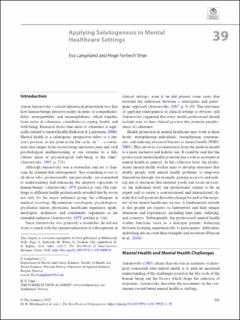| dc.contributor.author | Langeland, Eva | |
| dc.contributor.author | Vinje, Hege Forbech | |
| dc.date.accessioned | 2022-04-06T13:28:23Z | |
| dc.date.available | 2022-04-06T13:28:23Z | |
| dc.date.created | 2022-01-27T12:01:59Z | |
| dc.date.issued | 2022 | |
| dc.identifier.citation | Langeland, E., & Vinje, H. F. (2022). Applying Salutogenesis in Mental Healthcare Settings. In M. B. Mittelmark, G. F. Bauer, L. Vaandrager, J. M. Pelikan, S. Sagy, M. Eriksson, B. Lindström, & C. Meier Magistretti (Eds.), The Handbook of Salutogenesis (pp. 433–439). Springer International Publishing. | en_US |
| dc.identifier.isbn | 978-3-030-79514-6 | |
| dc.identifier.uri | https://hdl.handle.net/11250/2990287 | |
| dc.description.abstract | This chapter deals with salutogenesis for a specific and growing group of people with mental health challenges. It emphasizes the importance of high-quality social support in interplay with positive identity development thus promoting salutogenic capacity. Aaron Antonovsky’s core concept of sense of coherence has been shown to be more closely related to mental health than to physical health. Thus, the application of salutogenesis on clients in mental healthcare settings is rather obvious. First, the expression “mental health challenges” is used because it is less disease-focused and encourages one to keep in mind that, despite suffering from mental illness, there always is some level of health and resources present that can be recognized, utilized, and nurtured. Second, it can result in specific forms of salutogenic therapy, for example, talk-therapy groups that aim to support positive salutogenic identity building as a specific resistance resource and to improve the sense of coherence of participants by specific offers of social support. Third, as in all health care, the material and social setting itself should be designed by salutogenic principles as empowering by being comprehensible, meaningful, and manageable. This is especially important for more sensitive people with mental health challenges who also might experience longer stay in mental healthcare organizations. | en_US |
| dc.language.iso | eng | en_US |
| dc.publisher | Springer | en_US |
| dc.relation.ispartof | The Handbook of Salutogenesis Second Edition | |
| dc.rights | Navngivelse 4.0 Internasjonal | * |
| dc.rights.uri | http://creativecommons.org/licenses/by/4.0/deed.no | * |
| dc.title | Applying Salutogenesis in Mental Healthcare Settings | en_US |
| dc.type | Chapter | en_US |
| dc.type | Peer reviewed | en_US |
| dc.description.version | publishedVersion | en_US |
| dc.rights.holder | © The Author(s) 2022 | en_US |
| dc.source.pagenumber | 433-439 | en_US |
| dc.identifier.doi | 10.1007/978-3-030-79515-3_39 | |
| dc.identifier.cristin | 1991228 | |
| cristin.ispublished | true | |
| cristin.fulltext | original | |
| cristin.qualitycode | 1 | |

